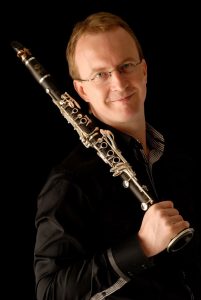“This concerto is amusing to listen to, at least I hope it is,” wrote composer Jean Françaix
October 28, 2019University of South Carolina Symphony Orchestra presents a trio of composers on Oct. 29
The University of South Carolina’s premier orchestra and one of the leading ensembles in the Southeast led by conductor Scott Weiss, presents Bohemian Rhapsody featuring acclaimed clarinetist Karel Dohnal. On the program is Françaix’s Clarinet Concerto, Smetana’s The Moldau, and Mozart’s Symphony No. 38 in D major “Prague.”
The concert takes place on Tuesday, October 29 at 7:30 p.m. at the Koger Center for the Arts (1051 Greene St). Valet parking is available. Preceding the concert is a pre-concert talk at 6:45 p.m. in the Koger lobby.
“This concerto is amusing to listen to, at least I hope it is,” wrote composer Jean Françaix. “But playing it is another matter. It is aerobatics display for the fingers with looping the loop, steep turns, and sudden dives to terrify the soloist, who must have nerves of steel and thousands of hours’ flying time under his belt. There are no free rides in this concerto, not even in the slow movement, where enchantingly long passages have to be played in a terrifyingly long single breath.”
Karel Dohnal, a tireless and enthusiastic promoter of the clarinet as a solo instrument and one of the most respected clarinetists today, performs the Clarinet Concert on this concert. Dohnal has played to audiences in many countries of Europe, Asia, North and South America, performing in chamber recitals and under the accompaniment of Prague Philharmonia and many others. During his career he has performed in concerts and recordings demonstrating that the technical and expressive potential of the clarinet makes it equally important as the violin, piano or cello, despite that the available repertoire is meager. Karel Dohnal unveils works that have been neglected, but which deserve to be performed along with other prominent works.
Françaix, the child of a singing teacher/choirmaster mother and a pianist/composer father, studied piano with his parents from the age of four and composed his first composition by age six. He was 9 years old when in 1921, upon learning of the death of the renowned pianist-composer Camille Saint-Saëns, he announced that he would take his place. He later studied piano at the Paris Conservatoire with Isidore Philipp, after which he studied composition with the great Nadia Boulanger.
In addition to operas, ballets, film scores, vocal pieces and chamber music, Françaix composed a number of orchestral works – primarily concertos for various instruments. Written as a student in 1932, his Piano Concertino already showed the mature mixture of wit, poetry, transparent orchestration and well-crafted themes that served him well through his Clarinet Concerto and on into his late concertos of the 1990s. Françaix’s Clarinet Concerto, written in 1967–68, earned a reputation of being unplayable among distinguished clarinetists. Jack Brymer, himself a virtuoso, wrote, “A work for the future, possibly, when the instrument has developed further or the human hand has changed. At present, its roulades in the key of B major are beyond almost any player; but the work is a worthwhile challenge, and the A-clarinet would probably provide the answer.” Jacques Lancelot premiered the Clarinet Concerto on July 20, 1968, and since then many clarinetists have taken it up with great success, despite Brymer’s pronouncement.
Bohemian composer Bedřich Smetana’s The Moldau, a symphonic poem, evokes the flow of the Vltava River from its source in the mountains of the Bohemian Forest, through the Czech countryside, to the city of Prague. A passionately patriotic work, The Moldau captures in music Smetana’s love of his homeland. Completed in 1874 and first performed the following year, the work premiered in its entirety in Prague on November 5, 1882. Smetana conceived of a series of orchestral pieces with topics drawn from the legends and landscapes of his homeland, what he called “musical pictures of Czech glories and defeats.” The Moldau ultimately became Smetana’s most enduring work.
Wolfgang Amadè Mozart was fond of the city and people of Prague and considered them to be an intellectual and musically savvy audience. The Prague Symphony – Symphony No. 38 – premiered in the city in 1787, and it remains one of Mozart’s most interesting and popular symphonies, owing to its richness of harmonic exploration.
Mozart completed Symphony No. 38 in Vienna on December 6, 1786, in anticipation of his visit to Prague in January 1787. Following the enormous success there of his opera Le nozze di Figaro, Mozart had been persuaded to travel to the Bohemian capital where he attended one performance of the opera and conducted another. He brought his new Symphony with him in expectation of performing it while he was there, an event that did take place on January 19 to an ecstatic reception by the citizens of Prague, both for his Symphony and for his piano playing. The happy relationship with the people of this city constituted one of the great bright spots in the last years of Mozart’s life. His popularity seemed to be declining in Vienna, but he continued to be adored in Prague.
Tickets
Concerts are FREE for USC students with student ID (must be picked up from the Koger Box Office, corner of Park and Greene, before 5:00 p.m. on the day of the performance).
General public $30; seniors/military/USC faculty and staff $25; children under 18 and non-USC students with ID $8
Save with a season subscription (6 concerts) and enjoy the best seats in the house: $150.
Discounts: $110 seniors/military/USC faculty and staff; $45 non-USC students. Season subscriptions and discounted tickets must be purchased by phone or in person at the Koger Box Office.
Call 803-251-2222, in person at Koger Box Office, corner of Greene and Park Streets (M-F 9 a.m. to 5 p.m.) or online at kogercenterforthearts.com

















